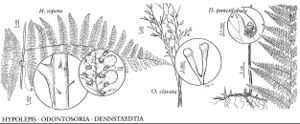Hypolepis
Neues J. Bot. 1(2): 34. 1806.
| Taxon | Illustrator ⠉ | |
|---|---|---|
 | Hypolepis repens Odontosoria clavata Dennstaedtia punctilobula | John Myers John Myers John Myers |
Plants terrestrial, often forming colonies. Stems subterranean, long-creeping; hairs reddish. Leaves scattered, arching, deltate, 45–160 cm [to 7 m]. Petiole glabrescent or pubescent, often with prickles, sometimes with stem buds near base; vascular-bundles more than 3, forming O-shaped pattern in cross-section. Blade 1–4-pinnate; rachises with prickles; nectaries absent. Segments pinnatifid, ultimate segments oblong, margins lobed. Veins free, simple or pinnately branched. Sori ± marginal at vein tips, discrete, mostly round, protected by revolute blade tooth, rarely inframarginal and unprotected. Spores ellipsoid, monolete, tuberculate or papillate. x = 26, 29.
Distribution
Worldwide in tropical regions
Discussion
Species ca. 45 (1 in the flora).